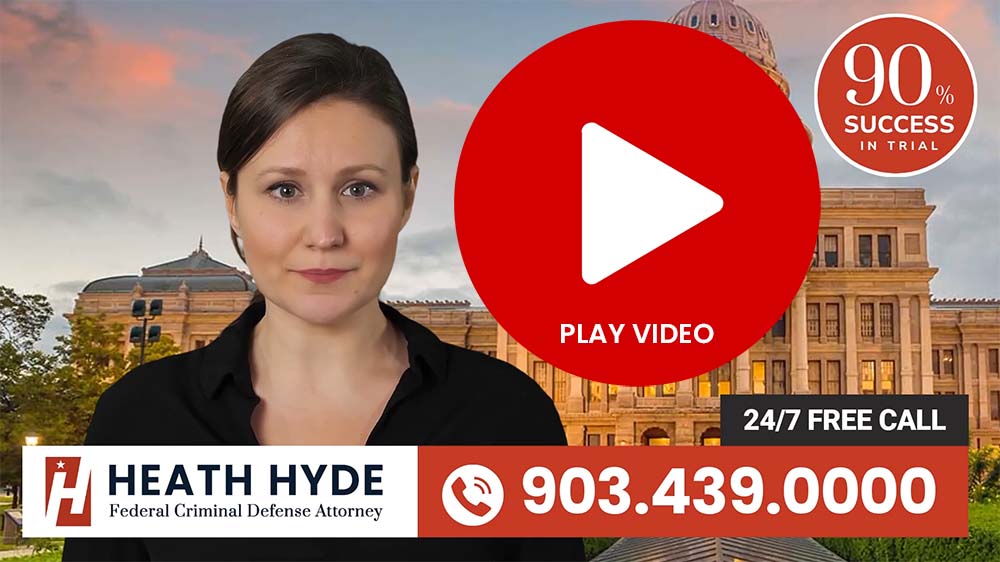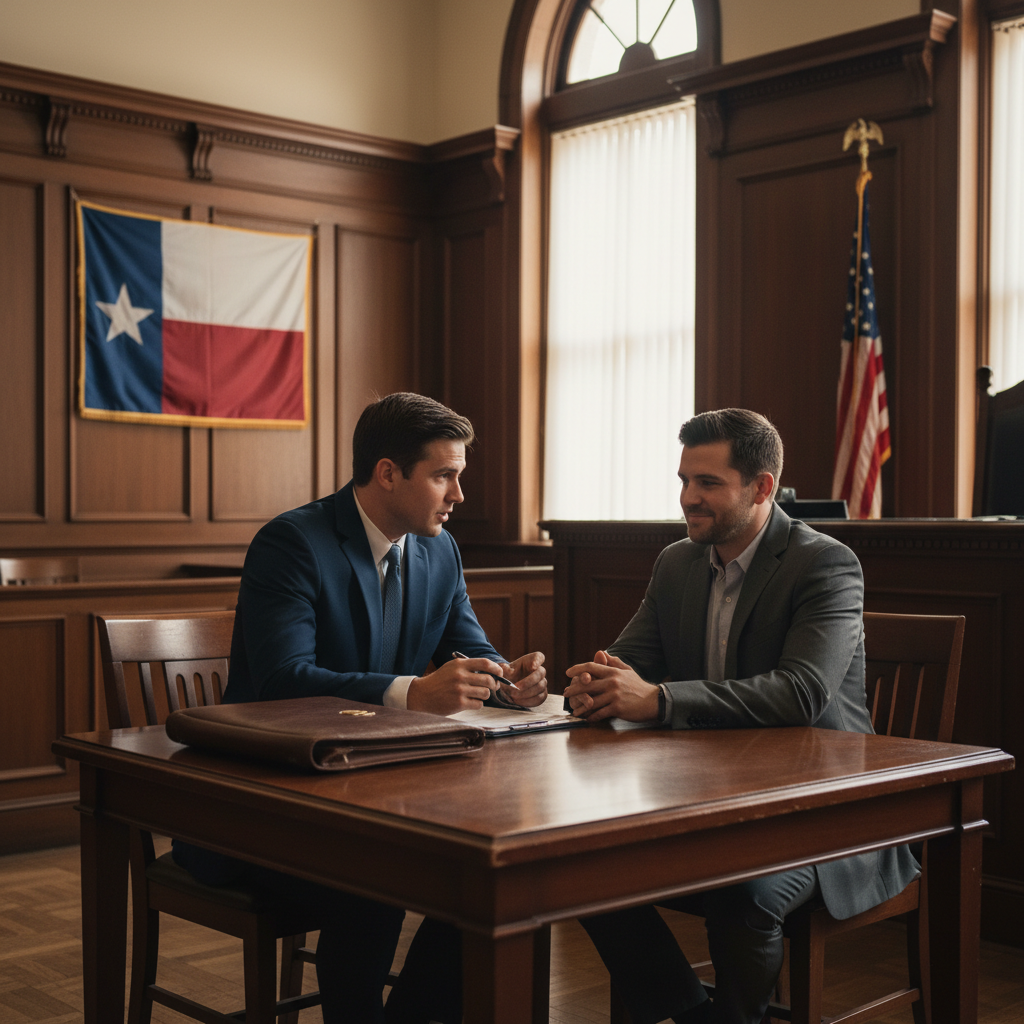Heath Hyde’s Anti-Kickback Statute lawyer team is thoroughly familiar with The Stark Law, the Anti-Kickback Statute, the Texas Patient Solicitation Act, the ban on the corporate practice of medicine, and all other laws, rules, and regulations that control physician business ownership.
We use this information to assist individual clinicians, hospitals, healthcare organizations, MSOs, and company owners in the healthcare industry in understanding precisely how these limits affect their operations.
As you may know, any transactions involving physician-owned enterprises should only be carried out after retaining the services of knowledgeable healthcare counsel due to the heavy regulation at the state and federal levels. Heath Hyde is an experienced federal criminal defense lawyer with knowledgeable healthcare fraud defense advice.

The Experienced Anti-Kickback Statute Lawyer
Our Dallas-based firm’s primary area of practice is healthcare law, which enables us to remain on top of developments in this area of the law. We have been successful in assisting a large number of clients throughout Texas in understanding their obligations under:
The Stark Law
Under certain conditions, the federal Stark Law forbids physicians from sending patients to another organization for designated health services (DHS). In particular, the doctor is prohibited from making the referral if they or a member of their immediate family has a business connection to the organization they are referring. There are exceptions to this rule, and a knowledgeable Stark Law attorney can assist you in determining if an exemption applies to your particular circumstance.
The Anti-Kickback Statute
The Anti-Kickback Statute sets criminal penalties on anyone who erroneously offers to trade anything of value in order to promote or induce a referral of business from a federal healthcare program.
Texas Patient Solicitation Act
This state law, which controls physician recommendations at the state level, is frequently referred to as Texas’ Stark Law.
Prohibition on the Corporate Practice of Medicine
According to legal doctrine, it is typically illegal for corporations, entities, or people to practice medicine, including non-physicians. These and other related laws can be broken with severe fines, withholding of payment for delivered services, and even jail time. As a result, the first thing you should think about when pursuing transactions with physician-owned firms is avoiding these hefty fines by careful planning and working with reliable counsel.
Contact Anti-Kickback Statute Lawyer Today
To speak confidentially with Heath Hyde’s Anti-Kickback Statute lawyer about the Stark Law, the Anti-Kickback Statute, and Texas Patient Solicitation Act about your case, call [tel_hh] or submit your case today.
Useful Resources – Related U.S. Code
42 U.S. Code § 1320a–7b – Criminal penalties for acts involving federal healthcare programs
(a) Making or causing to be made false statements or representations
Whoever—
(1) knowingly and willfully makes or causes to be made any false statement or representation of a material fact in any application for any benefit or payment under a Federal health care program (as defined in subsection (f)),
(2) at any time knowingly and willfully makes or causes to be made any false statement or representation of a material fact for use in determining rights to such benefit or payment,
(3) having knowledge of the occurrence of any event affecting (A) his initial or continued right to any such benefit or payment, or (B) the initial or continued right to any such benefit or payment of any other individual in whose behalf he has applied for or is receiving such benefit or payment, conceals or fails to disclose such event with an intent fraudulently to secure such benefit or payment either in a greater amount or quantity than is due or when no such benefit or payment is authorized,
(4) having made application to receive any such benefit or payment for the use and benefit of another and having received it, knowingly and willfully converts such benefit or payment or any part thereof to a use other than for the use and benefit of such other person,
(5) presents or causes to be presented a claim for a physician’s service for which payment may be made under a Federal health care program and knows that the individual who furnished the service was not licensed as a physician, or
(6) for a fee knowingly and willfully counsels or assists an individual to dispose of assets (including by any transfer in trust) in order for the individual to become eligible for medical assistance under a State plan under subchapter XIX, if disposing of the assets results in the imposition of a period of ineligibility for such assistance under section 1396p(c) of this title, shall
- (i) in the case of such a statement, representation, concealment, failure, or conversion by any person in connection with the furnishing (by that person) of items or services for which payment is or may be made under the program, be guilty of a felony and upon conviction thereof fined not more than $100,000 or imprisoned for not more than 10 years or both, or
- (ii) in the case of such a statement, representation, concealment, failure, conversion, or provision of counsel or assistance by any other person, be guilty of a misdemeanor and upon conviction thereof fined not more than $20,000 or imprisoned for not more than one year, or both. In addition, in any case where an individual who is otherwise eligible for assistance under a Federal health care program is convicted of an offense under the preceding provisions of this subsection, the administrator of such program may at its option (notwithstanding any other provision of such program) limit, restrict, or suspend the eligibility of that individual for such period (not exceeding one year) as it deems appropriate; but the imposition of a limitation, restriction, or suspension with respect to the eligibility of any individual under this sentence shall not affect the eligibility of any other person for assistance under the plan, regardless of the relationship between that individual and such other person.
(b) Illegal remunerations
(1) Whoever knowingly and willfully solicits or receives any remuneration (including any kickback, bribe, or rebate) directly or indirectly, overtly or covertly, in cash or in kind—
- (A) in return for referring an individual to a person for the furnishing or arranging for the furnishing of any item or service for which payment may be made in whole or in part under a Federal health care program, or
- (B) in return for purchasing, leasing, ordering, or arranging for or recommending purchasing, leasing, or ordering any good, facility, service, or item for which payment may be made in whole or in part under a Federal health care program, shall be guilty of a felony and upon conviction thereof, shall be fined not more than $100,000 or imprisoned for not more than 10 years, or both.
(2) Whoever knowingly and willfully offers or pays any remuneration (including any kickback, bribe, or rebate) directly or indirectly, overtly or covertly, in cash or in kind to any person to induce such person—
- (A) to refer an individual to a person for the furnishing or arranging for the furnishing of any item or service for which payment may be made in whole or in part under a Federal health care program, or
- (B) to purchase, lease, order, or arrange for or recommend purchasing, leasing, or ordering any good, facility, service, or item for which payment may be made in whole or in part under a Federal health care program, shall be guilty of a felony and upon conviction thereof, shall be fined not more than $100,000 or imprisoned for not more than 10 years, or both.
(3) Paragraphs (1) and (2) shall not apply to—
- (A) a discount or other reduction in price obtained by a provider of services or other entity under a Federal health care program if the reduction in price is properly disclosed and appropriately reflected in the costs claimed or charges made by the provider or entity under a Federal health care program;
- (B) any amount paid by an employer to an employee (who has a bona fide employment relationship with such employer) for employment in the provision of covered items or services;
- (C) any amount paid by a vendor of goods or services to a person authorized to act as a purchasing agent for a group of individuals or entities who are furnishing services reimbursed under a Federal health care program if—
- (I) the person has a written contract, with each such individual or entity, which specifies the amount to be paid the person, which amount may be a fixed amount or a fixed percentage of the value of the purchases made by each such individual or entity under the contract, and
- (ii) in the case of an entity that is a provider of services (as defined in section 1395x(u) of this title), the person discloses (in such form and manner as the Secretary requires) to the entity and, upon request, to the Secretary the amount received from each such vendor with respect to purchases made by or on behalf of the entity;
- (D) a waiver of any coinsurance under part B of subchapter XVIII by a Federally qualified health care center with respect to an individual who qualifies for subsidized services under a provision of the Public Health Service Act [42 U.S.C. 201 et seq.];
- (E) any payment practice specified by the Secretary in regulations promulgated pursuant to section 14(a) of the Medicare and Medicaid Patient and Program Protection Act of 1987 or in regulations under section 1395w–104(e)(6) [1] of this title;
- (F) any remuneration between an organization and an individual or entity providing items or services, or a combination thereof, pursuant to a written agreement between the organization and the individual or entity if the organization is an eligible organization under section 1395mm of this title or if the written agreement, through a risk-sharing arrangement, places the individual or entity at substantial financial risk for the cost or utilization of the items or services, or a combination thereof, which the individual or entity is obligated to provide;
- (G) the waiver or reduction by pharmacies (including pharmacies of the Indian Health Service, Indian tribes, tribal organizations, and urban Indian organizations) of any cost-sharing imposed under part D of subchapter XVIII, if the conditions described in clauses (i) through (iii) of section 1320a–7a(i)(6)(A) of this title are met with respect to the waiver or reduction (except that, in the case of such a waiver or reduction on behalf of a subsidy eligible individual (as defined in section 1395w–114(a)(3) of this title), section 1320a–7a(i)(6)(A) of this title shall be applied without regard to clauses (ii) and (iii) of that section);
- (H) any remuneration between a federally qualified health center (or an entity controlled by such a health center) and an MA organization pursuant to a written agreement described in section 1395w–23(a)(4) of this title;
- (I) any remuneration between a health center entity described under clause (i) or (ii) of section 1396d(l)(2)(B) of this title and any individual or entity providing goods, items, services, donations, loans, or a combination thereof, to such health center entity pursuant to a contract, lease, grant, loan, or other agreement, if such agreement contributes to the ability of the health center entity to maintain or increase the availability, or enhance the quality, of services provided to a medically underserved population served by the health center entity;
- (J) a discount in the price of an applicable drug (as defined in paragraph (2) of section 1395w–114a(g) of this title) of a manufacturer that is furnished to an applicable beneficiary (as defined in paragraph (1) of such section) under the Medicare coverage gap discount program under section 1395w–114a of this title; and
- (K) an incentive payment made to a Medicare fee-for-service beneficiary by an ACO under an ACO Beneficiary Incentive Program established under subsection (m) of section 1395jjj of this title, if the payment is made in accordance with the requirements of such subsection and meets such other conditions as the Secretary may establish.
(4) Whoever without lawful authority knowingly and willfully purchases, sells or distributes, or arranges for the purchase, sale, or distribution of a beneficiary identification number or unique health identifier for a health care provider under subchapter XVIII, subchapter XIX, or subchapter XXI shall be imprisoned for not more than 10 years or fined not more than $500,000 ($1,000,000 in the case of a corporation), or both.
(c) False statements or representations with respect to condition or operation of institutions
Whoever knowingly and willfully makes or causes to be made, or induces or seeks to induce the making of, any false statement or representation of a material fact with respect to the conditions or operation of any institution, facility, or entity in order that such institution, facility, or entity may qualify (either upon initial certification or upon recertification) as a hospital, critical access hospital, skilled nursing facility, nursing facility, intermediate care facility for the mentally retarded, home health agency, or other entity (including an eligible organization under section 1395mm(b) of this title) for which certification is required under subchapter XVIII or a State health care program (as defined in section 1320a–7(h) of this title), or with respect to information required to be provided under section 1320a–3a of this title, shall be guilty of a felony and upon conviction thereof shall be fined not more than $100,000 or imprisoned for not more than 10 years, or both.
(d) Illegal patient admittance and retention practicesWhoever knowingly and willfully—
(1) charges, for any service provided to a patient under a State plan approved under subchapter XIX, money or other consideration at a rate in excess of the rates established by the State (or, in the case of services provided to an individual enrolled with a medicaid managed care organization under subchapter XIX under a contract under section 1396b(m) of this title or under a contractual, referral, or other arrangement under such contract, at a rate in excess of the rate permitted under such contract), or
(2) charges, solicits, accepts, or receives, in addition to any amount otherwise required to be paid under a State plan approved under subchapter XIX, any gift, money, donation, or other consideration (other than a charitable, religious, or philanthropic contribution from an organization or from a person unrelated to the patient)—
- (A) as a precondition of admitting a patient to a hospital, nursing facility, or intermediate care facility for the mentally retarded, or
- (B) as a requirement for the patient’s continued stay in such a facility, when the cost of the services provided therein to the patient is paid for (in whole or in part) under the State plan, shall be guilty of a felony and upon conviction thereof shall be fined not more than $100,000 or imprisoned for not more than 10 years, or both.
(e) Violation of assignment terms
Whoever accepts assignments described in section 1395u(b)(3)(B)(ii) of this title or agrees to be a participating physician or supplier under section 1395u(h)(1) of this title and knowingly, willfully, and repeatedly violates the term of such assignments or agreement, shall be guilty of a misdemeanor and upon conviction thereof shall be fined not more than $4,000 or imprisoned for not more than six months, or both.
(f) “Federal health care program” definedFor purposes of this section, the term “Federal health care program” means—
(1) any plan or program that provides health benefits, whether directly, through insurance, or otherwise, which is funded directly, in whole or in part, by the United States Government (other than the health insurance program under chapter 89 of title 5); or
(2) any State health care program, as defined in section 1320a–7(h) of this title.
(g) Liability under subchapter III of chapter 37 of title 31
In addition to the penalties provided for in this section or section 1320a–7a of this title, a claim that includes items or services resulting from a violation of this section constitutes a false or fraudulent claim for purposes of subchapter III of chapter 37 of title 31.
(h) Actual knowledge or specific intent not required
With respect to violations of this section, a person need not have actual knowledge of this section or specific intent to commit a violation of this section.
(Aug. 14, 1935, ch. 531, title XI, § 1128B, formerly title XVIII, § 1877(d), and title XIX, § 1909, as added and amended Pub. L. 92–603, title II, §§ 242(c), 278(b)(9), Oct. 30, 1972, 86 Stat. 1419, 1454; Pub. L. 95–142, § 4(a), (b), Oct. 25, 1977, 91 Stat. 1179, 1181; Pub. L. 96–499, title IX, § 917, Dec. 5, 1980, 94 Stat. 2625; Pub. L. 98–369, div. B, title III, § 2306(f)(2), July 18, 1984, 98 Stat. 1073; renumbered title XI, § 1128B, and amended Pub. L. 100–93, §§ 4(a)–(d), 14(b), Aug. 18, 1987, 101 Stat. 688, 689, 697; Pub. L. 100–203, title IV, §§ 4039(a), 4211(h)(7), Dec. 22, 1987, 101 Stat. 1330–81, 1330–206; Pub. L. 100–360, title IV, § 411(a)(3)(A), (B)(i), July 1, 1988, 102 Stat. 768; Pub. L. 101–239, title VI, § 6003(g)(3)(D)(ii), Dec. 19, 1989, 103 Stat. 2153; Pub. L. 101–508, title IV, §§ 4161(a)(4), 4164(b)(2), Nov. 5, 1990, 104 Stat. 1388–94, 1388–102; Pub. L. 103–432, title I, § 133(a)(2), Oct. 31, 1994, 108 Stat. 4421; Pub. L. 104–191, title II, §§ 204(a), 216(a), 217, Aug. 21, 1996, 110 Stat. 1999, 2007, 2008; Pub. L. 105–33, title IV, §§ 4201(c)(1), 4704(b), 4734, Aug. 5, 1997, 111 Stat. 373, 498, 522; Pub. L. 108–173, title I, § 101(e)(2), (8)(A), title II, § 237(d), title IV, § 431(a), Dec. 8, 2003, 117 Stat. 2150, 2152, 2213, 2287; Pub. L. 111–148, title III, § 3301(d)(1), title VI, § 6402(f), Mar. 23, 2010, 124 Stat. 468, 759; Pub. L. 114–115, § 8, Dec. 28, 2015, 129 Stat. 3134; Pub. L. 115–123, div. E, title III, § 50341(b), title IV, § 50412(a)(2), (b), Feb. 9, 2018, 132 Stat. 208, 220.)






